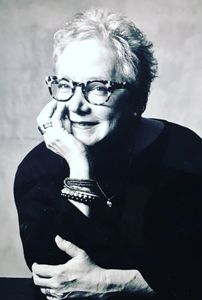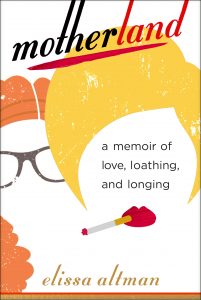Elissa Altman (CGS’83, CAS’85) on the Books and Classes that Shaped Her Work

Critically-acclaimed writer Elissa Altman (CGS’83, CAS’85) has authored Treyf: My Life as an Unorthodox Outlaw and Poor Man’s Feast: A Love Story of Comfort, Desire, and the Art of Simple Cooking, praised by The New York Times Book Review as “one of the finest food memoirs of recent years.” Her newest book, Motherland: A Memoir of. Love, Loathing, and Longing, will be available on August 6, 2019. You can see her in person at Brookline Booksmith on August 6th at 7pm. Altman spoke with CGS about her time at Boston University and her evolution as a writer.
College of General Studies: So tell us, who were you when you first arrived at Boston University College of General Studies? What did you look like in that part of your life?
Elissa Altman: I was sort of like an amoeba. I really didn’t know what I wanted to do and CGS was really the perfect place for me to be, because I wanted to be in a strong liberal arts environment. I arrived knowing that there were certain things that I really loved to do and that I excelled at—and certainly, writing was one of them. The amount of writing and essay-writing that I was asked to do from the word “go” was tremendous. I always say that CGS taught me to think like an essayist. It taught me to think like a writer, before I even believed for a second that that was something that I could do and could make my living at doing.
Was it particular classes that helped you do this or people who influenced you?
I think it was all of my classes. Even outside of the humanities and rhetoric curriculum, I was asked to think like an essayist in the other classes as well. For me—as somebody who was profoundly compelled by language, the written word and the spoken word—I would certainly say that it was humanities and rhetoric that most ushered me along. I was very, very lucky to have [former College of General Studies Dean] Linda Wells for four straight semesters. After I left CGS, we became very close and she was an enormous influence on the way I thought about writing and reading. Linda made me work harder than anybody has ever made me work in my life and made me think harder than anybody. It was a remarkable thing. It was a remarkable experience. My writing got better, my thinking got clearer, I fell in love with literature, I fell in love with writing, with the practice and the art of writing.
Are there any books or authors you read at BU that influenced your style or became part of your literary backdrop?
I came to CGS as a very big reader. There was language in my house and writing in my house all the time. It was very important in my life as a child and it was part of the fabric of our family, without question. When I got to BU, it was 1981, it was a time of great change. The curriculum included Adrienne Rich in Linda Wells’ class. I’m sitting here in my office looking up at a copy of Of Woman Born by Adrienne Rich, which I used heavily for reference in my book that’s coming out in August.
I definitely was influenced by much of the curriculum at CGS, and rhetoric was a wonderful class that was very observational. It taught me to focus and to write in as concise a manner as I could. Rhetoric made me write and think about the things that were there in front of me as they were and as they are—and not as I hoped that they might be. That’s a big thing. I have a big background as a food writer and that was my jumping-off point into the world of being a full-time writer.
 CGS talks about its program being interdisciplinary and your writing combines a lot of different threads. You tie together religion, food, memoir, culture … Would you see your writing as interdisciplinary?
CGS talks about its program being interdisciplinary and your writing combines a lot of different threads. You tie together religion, food, memoir, culture … Would you see your writing as interdisciplinary?
Thank you. I think that’s a very good way and an accurate way to describe it. I think that invariably when you are writing about food you’re also writing about history, you’re writing about culture, you’re writing about science, you’re writing memoir.
When you pick up a book by somebody like MFK Fisher or Laurie Colwin—all of those things are there. The science is there, the culture is there, the history is there. For me, I love food, I love talking about food, I love the idea of nurturing and sustenance. But I’m also so interested in the table and the place of the table in culture.
Any other thoughts?
I think about CGS a lot. It was such an extraordinary program, it was such an extraordinary experience. CGS was really a lifechanging experience for me – like a two-year long intellectual outward bound. It really pushed me, it really made me the writer I am. CGS taught me how to think, it taught me how to write. To say that I’m grateful is a massive understatement.